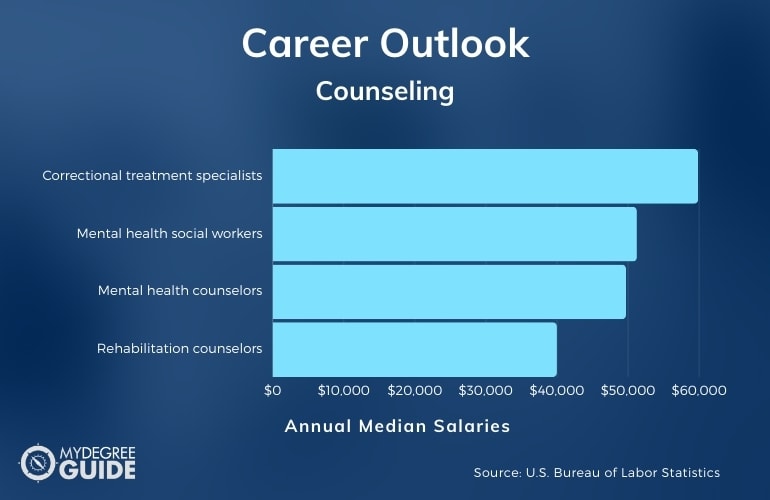As you look at college majors, you may ask, “Can you be a counselor with a social work degree?”

Counselors are professionals who help people navigate the challenges in their lives. Because counselors play such an important role in helping others, this can be a fulfilling and meaningful career for many.
Editorial Listing ShortCode:
If you want to work as a professional counselor, then read on to discover whether a social work degree could help you accomplish your goal.
Are Social Work Graduates Eligible to Work as Counselors?

Yes, social work graduates are often eligible to work as counselors, particularly if their educational curriculum includes coursework or concentrations relevant to counseling. Social work and counseling are closely related. Both professions involve supporting people and helping them improve their lives. In fact, for many social workers, counseling is their main job focus.
Many types of counseling align well with the field of social work:
- Behavioral therapy
- Correctional counseling
- Family therapy
- Mental health counseling
- Rehabilitation counseling
- School counseling
- Substance abuse counseling
Working in one of those areas, you may frequently draw on the lessons learned in your Bachelor of Social Work (BSW) program. Even still, it’s often necessary to conduct more research and get more education before fully launching your counseling career.
Most counseling positions require a graduate degree and state licensure. Fortunately, your BSW will likely help you meet the admissions requirements for a grad program. You may be eligible to start working in the counseling field before earning such credentials. For instance, some states allow people with bachelor’s degrees to work as substance abuse counselors.
It’s also worth noting that a graduate degree is important for counseling independently. With a bachelor’s degree, you may be able to perform an entry-level counseling role under the supervision of a more advanced professional.
Specializations
By selecting a specialization within counseling, you can hone your skills and direct your passion toward the area you feel most drawn to. Here’s are five potential concentrations you might consider:
- Addiction Counseling. This specialization focuses on helping individuals overcome substance abuse and related behavioral issues. Addiction counselors aim to guide people through recovery and help them rebuild their lives.
- School Counseling. School counseling focuses on supporting students’ academic, career, social, and emotional needs.
- Marriage and Family Therapy (MFT). MFT allows you to work closely with families and couples, facilitating communication and resolving conflicts to improve relationships.
- Mental Health Counseling. This specialization focuses on providing support for mental health issues ranging from depression and anxiety to stress and life transitions.
- Career Counseling. This concentration is geared toward those who want to help others find their professional path. Career counseling involves assisting individuals in understanding their strengths and interests to make informed career choices.
When choosing the specialization that’s right for you, it’s strategic to consider your interests, your strengths, and the type of impact you want to have in people’s lives.
Academic Prerequisites for a Career in Counseling

For an effective counseling career, it’s beneficial to understand human thought and behavior. That’s knowledge you could gain in a BSW program’s psychology classes. Additionally, a BSW can equip you with foundational skills for individual and group counseling.
You can also learn how to interact with a diverse assortment of people. While a Bachelor of Social Work can train you in these areas, it’s not the only undergraduate degree that can help you get started with a counseling career. You could also consider majoring in psychology or counseling.
Most counseling roles require education beyond the bachelor’s degree. For clinical social work, a Master of Social Work (MSW) is required. A BSW could also prepare you to transition into a psychology, counseling, or behavioral therapy grad program.
A graduate program will expand your counseling skills, teach you about mental health assessments and treatments, and offer practicum opportunities. Clinical social work students focus on helping patients access resources for successful living.
Counselors Licensure and Certifications

According to the American Counseling Association, all states say that professionals must be licensed to work as counselors.
The general licensing requirements usually include earning a graduate degree, taking a test, and gaining supervised experience, but the details can vary depending on what type of counselor you plan to be. Those with a social work background may choose to pursue licensure as a licensed clinical social worker (LCSW).
For an LCSW credential, your state will probably have you complete an accredited MSW, pass an exam from the Association of Social Work Boards (ASWB), and earn supervised hours. The process of completing clinical social work hours often takes 2 to 3 years.
For those with licensure and experience, the American Board of Clinical Social Work (ABCSW) offers board certifications in areas like group psychotherapy, clinical supervision, and clinical couple and family social work.
Transferring Skills from Social Work to Counseling

Are you weighing the differences between social worker vs. mental health counselor? If so, consider this: You could become a social worker who provides mental health counseling! Many of a social worker’s skills are useful in counseling settings.
Social workers interact with people from diverse backgrounds and assist them without passing judgment. Those skills could aid you in listening supportively to a wide variety of clients. Social workers are problem-solvers. When people are facing issues, social workers can help them access support.
As a counselor, you could help people identify solutions to their problems and make plans to carry out their ideas. You can also point your clients toward useful resources in the community. Social workers are often organized and detail-oriented, especially those who interact with multiple clients every day. You could utilize those same skills to manage a counseling schedule and keep records of therapy sessions.
Employment Opportunities

If you have a degree in social work, there are different types of counseling jobs in which you could use your communication, problem-solving, and case-management skills.
According to the Bureau of Labor Statistics, here are the median annual salaries of various counseling roles:
- Rehabilitation counselors — $39,990
- Substance abuse, behavioral disorder, and mental health counselors — $49,710
- Mental health social workers — $51,240
- Correctional treatment specialists and probation officers — $59,860
A bachelor’s degree in counseling or social work can provide foundational lessons in working with people, but some roles will also require graduate studies and a state license.
Understanding Accreditation’s Impact
When it comes to your education and future career in counseling or social work, the accreditation of your program plays a pivotal role.
Accreditation ensures that your program meets rigorous academic and professional standards. The Council for Accreditation of Counseling and Related Educational Programs (CACREP) is the programmatic accreditor for counseling programs. The Council on Social Work Education (CSWE) accredits social work programs.
State licensing boards often list programmatic accreditation as a qualification for licensure. Many employers also require or prefer graduates from accredited programs. Additionally, regional accreditation is crucial, as it assures the quality and credibility of your institution as a whole. The accreditation status of your school can affect graduate school admissions, eligibility for federal aid, and the transferability of credits.
The US Department of Education lists recognized regional accrediting organizations on their website. Together, these two forms of accreditation safeguard the value of your education, ensuring that your degree is recognized.
Financial Considerations
When planning your education in counseling or social work, it’s helpful to know the variety of financial aid options available to support qualifying students:
- Federal aid. You can fill out the Free Application for Federal Student Aid (FAFSA), to determine your eligibility for need-based aid, such as grants, loans, and work-study programs.
- State aid. Programs offered by your state can provide additional financial support based on various eligibility criteria.
- Employer tuition assistance. Many employers offer programs to assist with tuition costs, recognizing the value of further education and skills development in their employees.
- Scholarships. Scholarships can be offered by your school as well as external organizations. These are often awarded based on merit, need, or your specific study area.
These financial aid options can help you manage the financial aspects of your studies. When comparing schools, you may also want to compare their financial aid offerings.
Professional Organizations
There are a number of organizations that bridge social work and counseling, offering resources, advocacy, and community for professionals transitioning between both fields. Here are some to explore:
- National Association of Social Workers: NASW is the largest membership organization of professional social workers in the United States. It offers resources, advocacy, and professional development opportunities.
- American Counseling Association: Though primarily for counselors, ACA welcomes professionals from various backgrounds, including social work. ACA provides extensive resources, education, and networking opportunities.
- Council on Social Work Education: While CSWE is an accrediting body for social work education, CSWE also provides resources and advocacy for social work professionals pursuing careers in various fields, including counseling.
These organizations offer a wealth of resources for professionals transitioning from social work to counseling, including continuing education and networking opportunities.
Can I Become a School Counselor with an MSW?
A Master of Social Work (MSW) can be a valuable stepping stone to becoming a school counselor. The transition typically requires additional steps, such as meeting specific coursework requirements or obtaining certification based on state regulations.
Your background in social work, though, could provide a solid foundation for making a meaningful impact in schools. Social work skills are highly relevant and transferable to the school counseling context, where you can support students’ academic, personal, and social development.
What’s the Difference Between a Masters in Social Work vs. Counseling?
Graduate degrees in social work or counseling can lead to counseling careers.
| Master’s Degree in Counseling | Master’s Degree in Social Work |
|
|
Despite the counselor vs. social worker curriculum differences, both programs usually require supervised work experiences.
Becoming a Counselor with a Social Work Degree

As a counselor, you can make a lasting difference in other people’s lives. Whether you focus on substance abuse treatment, behavioral counseling, marriage therapy, or another aspect of this profession, showcasing the varied paths possible with a social work degree. This diversity answers the question, “What can you do with a social work degree besides social work?” and highlights counseling as a rewarding option.
Getting an undergraduate social work degree could be the first step toward this job. Some counseling roles require you to obtain licensure and a graduate degree as well, but a Bachelor of Social Work (BSW) can act as a solid foundation.
Online social work studies are also available for students who want convenience and flexibility. You could start your educational journey today by searching for in-person or online social work degree programs from accredited schools.
